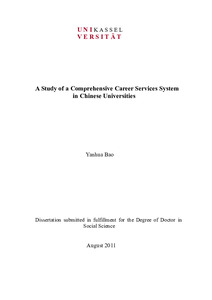| dcterms.abstract | Since 1999, with the adoption of expansion policy in higher education by the Chinese government, enrollment and graduate numbers have been increasing at an unprecedented speed. Accustomed to a system in which university graduates were placed, many students are not trained in “selling themselves”, which exacerbates the situation leading to a skyrocketing unemployment rate among new graduates. The idea of emphasizing career services comes with increasing employment pressure among university graduates in recent years. The 1998 “Higher Education Act” made it a legislative requirement. Thereafter, the Ministry of Education issued a series of documents in order to promote the development of career services. All higher education institutions are required to set up special career service centers and to set a ratio of 1:500 between career staff and the total number of students. Related career management courses, especially career planning classes, are required to be clearly included as specific modules into the teaching plan with a requirement of no less than 38 sessions in one semester at all universities. Developing career services in higher education has thus become a hot issue.
One of the more notable trends in higher education in recent years has been the transformation of university career service centers from merely being the coordinators of on-campus placement into full service centers for international career development. The traditional core of career services in higher education had been built around guidance, information and placements (Watts, 1997). This core was still in place, but the role of higher education career services has changed considerably in recent years and the nature of each part is being transformed (Watts, 1997). Most services are undertaking a range of additional activities, and the career guidance issue is emphasized much more than before.
Career management courses, especially career planning classes, are given special focus in developing career services in the Chinese case. This links career services clearly and directly with the course provision function. In China, most career service centers are engaging in the transformation period from a “management-oriented” organization to a “service-oriented” organization. Besides guidance services, information services and placement activities, there is a need to blend them together with the new additional teaching function, which follows the general trend as regulated by the government. The role of career services has been expanding and this has brought more challenges to its development in Chinese higher education.
Chinese universities still remain in the period of exploration and establishment in developing their own career services. In the face of the new situation, it is very important and meaningful to explore and establish a comprehensive career services system to address student needs in the universities. A key part in developing this system is the introduction of career courses and delivering related career management skills to the students. So there is the need to restructure the career service sectors within the Chinese universities in general. The career service centers will operate as a hub and function as a spoke in the wheel of this model system, providing support and information to staff located in individual teaching departments who are responsible for the delivery of career education, information, advice and guidance. The career service centers will also provide training and career planning classes.
The purpose of establishing a comprehensive career services system is to provide a strong base for student career development. The students can prepare themselves well in psychology, ideology and ability before employment with the assistance of effective career services. To conclude, according to the different characteristics and needs of students, there will be appropriate services and guidance in different stages and different ways. In other words, related career services and career guidance activities would be started for newly enrolled freshmen and continue throughout their whole university process.
For the operation of a comprehensive services system, there is a need for strong support by the government in the form of macro-control and policy guarantee, but support by the government in the form of macro-control and policy guarantee, but also a need for close cooperation with the academic administration and faculties to be actively involved in career planning and employment programs. As an integral function within the universities, career services must develop and maintain productive relationships with relevant campus offices and key stakeholders both within the universities and externally. | eng |

